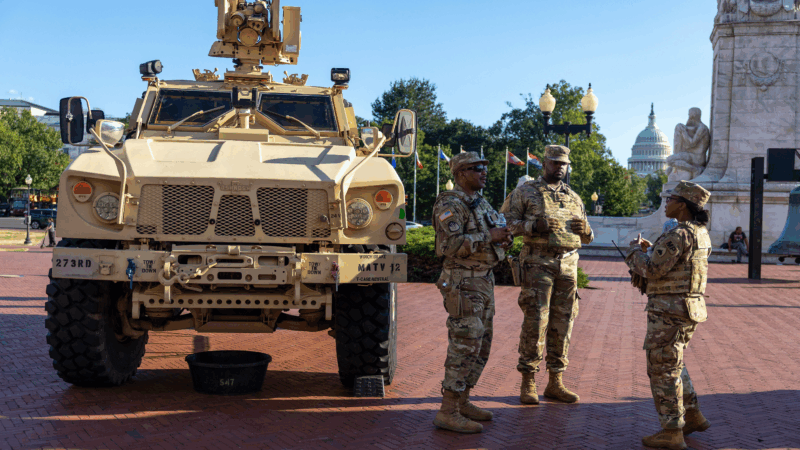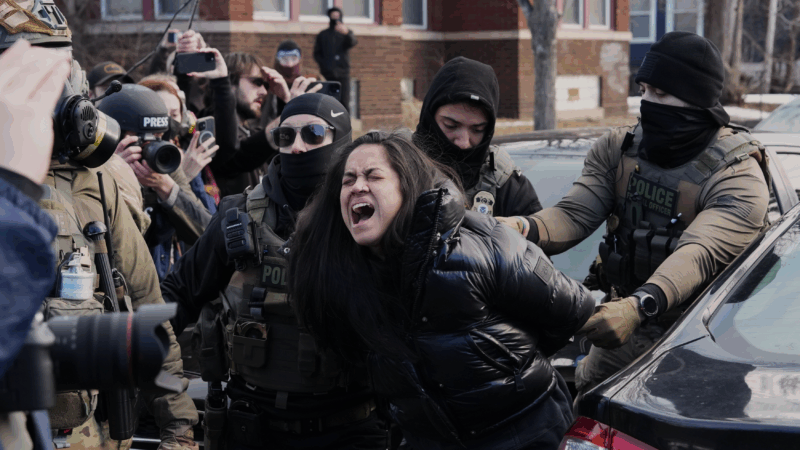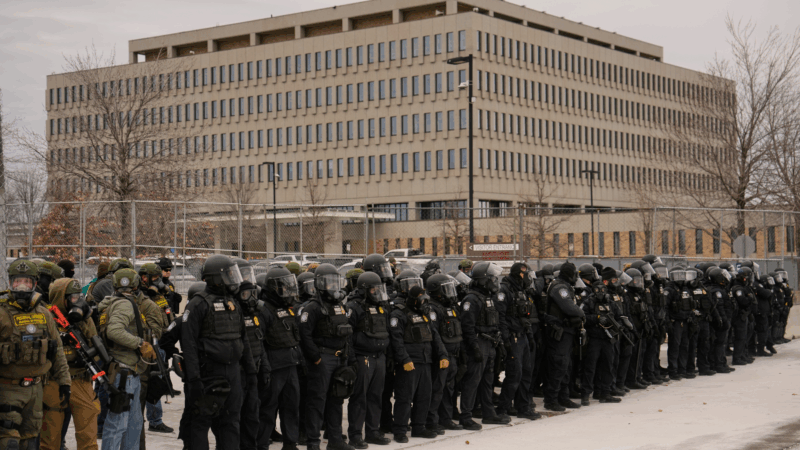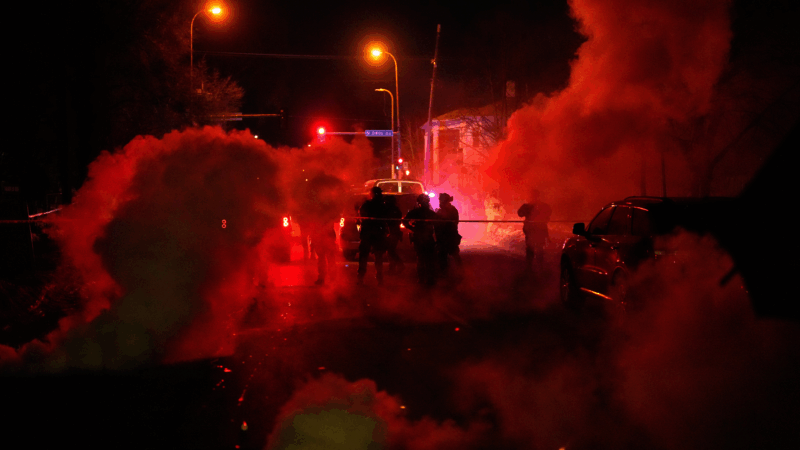Trump’s D.C. takeover has led to more arrests. NPR looks at cases of those swept up
A little more than three weeks ago, President Trump placed the Washington, D.C., police under federal control and put the National Guard on the city’s streets to crush crime and “clean up” the nation’s capital.
Although crime in D.C. was already in decline after spiking during the pandemic, the administration has cast the operation, which also includes a surge of federal law enforcement officers, as a major success.
“We’ve had some incredible results,” Trump said last month while visiting law enforcement officers in southeast D.C. “It’s like a different place. It’s like a different city.”
Trump, who travels in an armored limousine with a huge security detail, also said: “I feel very safe now.”
The White House said on Tuesday that 1,669 people have been arrested since the president’s surge of federal officers into the nation’s capital began on Aug. 7. A sizeable chunk of those arrests are for immigration-related offenses.
The administration has not provided the names or case numbers for any of the individuals who have been arrested or what they’ve been charged with on an individual basis, despite repeated NPR requests for such information.
NPR combed through court records and other data for the first two weeks of Trump’s takeover of D.C. police — Aug. 11 to Aug. 25 — to get a better understanding of who has been swept up in the federal surge for non-immigration offenses and what charges they are facing.
The situation in the nation’s capital is unique.
There is no local district attorney’s office in Washington, D.C. Instead, federal prosecutors at the U.S. Attorney’s Office handle both local and federal crimes. The D.C. Attorney General’s Office, meanwhile, prosecutes juvenile crimes as well as certain adult misdemeanors for local crimes.
Prosecutions for local crimes go through the Superior Court of the District of Columbia, while federal cases land in U.S. District Court.
The vast majority of people arrested or formally charged over the Aug. 11 to Aug. 25 timeframe — nearly 1,100 defendants — saw their cases go through superior court.
Lawyers who work in the courthouse say they are swamped. The courtroom where defendants are arraigned has on some days been working past 1 a.m., which attorneys say is almost unheard of.
Of the more than 1,050 defendants whose cases have gone to superior court, prosecutors charged around 20% with felonies: more serious offenses that include drug and gun crimes.
The remaining 80% of the cases were either misdemeanors, warrants, traffic offenses or prosecutors dropping the case.
Attorneys say prosecutors decide not to pursue a case — a move known as “no papering” — for a range of reasons, including weak evidence, a questionable search or finding that the alleged offense is too minor to merit the time and expense of pursuing it.
The percentage of cases the U.S. Attorney’s Office drops at this early stage varies, but in recent months it has been between 10% and 20%, according to lawyers who work in the courthouse.
In the first week of the federal takeover, prosecutors dropped around 17% of cases, according to records reviewed by NPR.
In the second week, that figure fell to less than 1%.
Defense attorneys say that shift is striking since the deficiencies that previously led the U.S. Attorney’s Office to weed out certain cases have not suddenly stopped occurring.
Federal cases
At least 35 cases were filed and unsealed in federal court over the first two weeks of the takeover. More than half of those involved gun charges or gun and drug charges, according to an NPR analysis.
In one case, federal agents pulled a car over after the driver failed to use his turn signal, according to court papers. Officers allegedly found a loaded handgun, 143.5 grams of crack cocaine, plastic baggies and $900 in cash in the car.
The driver, Anthony Grant, had multiple prior convictions for drug and gun-related offenses. A judge has ordered him to remain in custody without bond.
The second most common charge among these cases is assaulting, resisting or impeding certain officers. Some of those cases involve violence. In one instance, court papers say the defendant struck a federal agent with his car while fleeing an attempted arrest at a gas station.
Several of these cases, however, involve contact with officers that falls far short of that.
One defendant, for example, Sean Charles Dunn, threw a sub sandwich at a federal agent, hitting the officer in the chest.
In another case, the defendant, Scott Pichon, allegedly spit on two South Carolina National Guard troops while riding past them on a scooter outside D.C.’s Union Station.
Questions of overreach
Despite an aggressive push from law enforcement and prosecutors, some of the cases have unraveled before federal judges and grand juries.
Take the gun case against Torez Riley. Police said in court papers that they found two firearms in Riley’s crossbody satchel when they stopped him in a Trader Joe’s grocery store. Riley had previously been convicted on weapons and drug charges, according to court papers.
At a hearing last week, U.S. Magistrate Judge Zia Faruqui said Riley appeared to have been singled out by the police because he was a Black man carrying a satchel that looked heavy.
“It is without a doubt the most illegal search I’ve even seen in my life,” Faruqui said from the bench. “I’m absolutely flabbergasted at what has happened. A high school student would know this was an illegal search.”
The U.S. Attorney’s Office later filed papers to dismiss the case, which the judge granted.
Other cases have run into trouble with grand juries.
It is extremely rare for grand juries to reject charges proposed by prosecutors.
But on multiple occasions in recent weeks grand juries in D.C. have done exactly that, including in the case against the man who hurled a sandwich at a federal agent.
In that instance, prosecutors reduced the charge to a misdemeanor after failing to secure an indictment from the grand jury.
NPR’s Luke Garrett and Carrie Johnson contributed to this report.
Transcript:
ARI SHAPIRO, HOST:
Just over three weeks ago, President Trump federalized the police department and deployed the National Guard here in Washington. The administration says it’s crushing crime and cleaning up the city. NPR’s Ryan Lucas has been digging through court records to find out who’s being arrested and what they’re being charged with. Hey, Ryan.
RYAN LUCAS, BYLINE: Hi there.
SHAPIRO: Let’s jump right in. What exactly have you been looking at?
LUCAS: So because the administration hasn’t provided names or case numbers for the people who have been arrested since the federal takeover here in D.C., it’s something that I wanted to try to find out. Now, D.C. is unique in that the U.S. attorney’s office here prosecutes both local and federal cases. The vast majority end up in Superior Court, which is basically the local courthouse for local crimes. A small sliver end up in federal court.
So I talked to the lawyers, looked at court and arrest records and other things for cases filed in federal court and Superior Court over the first two weeks of Trump’s federalization of the D.C. police – so from August 11 to August 25 – to see what we could learn. And just to be clear, I didn’t look at any of the immigration arrests that have happened. That’s a separate bucket.
SHAPIRO: OK, so if not immigration, then what did you find? What are people being charged with?
LUCAS: So let’s start with Superior Court because the vast majority of people who are arrested go there. Attorneys in that courthouse say that they are swamped. The room where defendants are arraigned has, on some days, been working until 1 in the morning, I’m told…
SHAPIRO: Wow.
LUCAS: …Which lawyers say is basically unheard of. Now, around 1,050 people were arrested and had their cases go through superior court over those first two weeks. A little under 20% of those cases were charged as felonies, so as more serious offenses. The rest – around 80% – were a mix of misdemeanors, warrants, things like traffic offenses, or prosecutors decided to drop the case. Lawyers say the overall number of arrests is up, but the percentage of felonies is roughly in line with the norm.
SHAPIRO: You said the U.S. attorney’s office drops some cases. How many have they dropped?
LUCAS: So this is really interesting. Lawyers say the percentage of cases that the U.S. attorney’s office drops at this early stage varies, but it’s usually in the 10- to 20% range. And the office doesn’t pursue the case for a host of reasons. It could be the evidence is weak, or it could be that there’s a problem with the paperwork.
Now, I obtained what’s known as a no-paper list for every day of those first two weeks. It has a bunch of information, including whether the U.S. attorney’s office is dropping the prosecution. In the first week of the federal takeover, the U.S. attorney’s office dropped 17% of the cases. In the second week, that figure dropped to less than 1%. And that change is really striking because it’s not like the issues that previously led the U.S. attorney’s office to drop some cases have suddenly stopped happening.
SHAPIRO: And then what about the cases that have gone to federal court?
LUCAS: Right, there were 35 cases that have been unsealed in federal court in the first two weeks of the takeover. Of those, more than half involved gun charges or a mix of gun and drug charges. The other charge that has shown up a lot is assaulting, resisting or impeding certain officers. Twelve people face that charge. Some of those involve violence. In one instance, for example, court papers say the defendant struck a federal agent with his car while fleeing an attempted arrest. But several of these are not that. In one notable case, a guy threw a sub sandwich at a federal agent, and another, a guy on a scooter allegedly spit on two National Guard troops while scooting by them.
SHAPIRO: So big picture, what do these cases tell us about Trump’s takeover of the D.C. police and his arguments about crime here?
LUCAS: So the number of arrests is up. That’s clear. But again, less than 20% of those are felonies. The most striking thing, though, is how judges and D.C. grand juries have pushed back on some of this. A federal judge dismissed one of the gun cases because the defendant had been subject to what the judge called, quote, “the most illegal search,” unquote, that he has ever seen. And we’ve also seen grand juries in D.C. refuse to indict in some cases, which is very rare. One of those instances was the case against the man who threw the sub sandwich at an immigration officer. So that suggests that at least in some instances, some of these cases are being seen as overreach on the part of the Trump administration.
SHAPIRO: NPR’s Ryan Lucas. Thank you.
LUCAS: Thank you.
Major plumbing headache haunts $13 billion U.S. carrier off the coast of Venezuela
The crew of USS Ford is struggling to handle sewage problems on board the Navy's newest carrier.
They quit their day jobs to bet on current events. A look inside the prediction market mania
Prediction market apps are thriving in Trump's second term, with traders betting on migrant deportations to election outcomes. A community of young, mostly male and very online traders are driving the industry's bonanza.
Events in Minneapolis show how immigration enforcement has changed. What’s the impact?
Minneapolis is at the center of sweeping, evolving federal immigration push. It demonstrates how different immigration enforcement is under Trump's second administration - and raises questions about the lingering effects on local communities and law enforcement.
Yes, introverts and extroverts can be good friends. Here’s how
Can't seem to match the energy of a good friend? You might be on opposite ends of the personality spectrum — and that's OK. Here's how to foster deep connections despite your differences.
Trump is threatening to cut funding from sanctuary cities. Here’s what to know
President Trump says he's cutting federal money to sanctuary cities. But courts have blocked similar moves, ruling that the federal government can't use funding to coerce state and local governments.
Judge rules immigration officers in Minneapolis can’t detain peaceful protesters
Officers in the Minneapolis-area participating in a U.S. immigration enforcement operation can't detain or tear gas peaceful protesters who aren't obstructing authorities, a judge ruled Friday.






